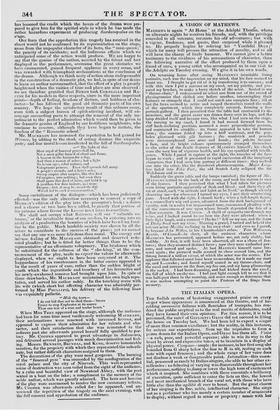A VISION OF MATHEWS.
MATHEWS is again "At Home S' at the Adelphi Theatie, where on alternate nights he receives his friends, and, with the privilege conceded to all veterans, recounts his old adventures; but with a vigour, freshness, and gusto, that surprised while it pleased us. He properly begins by reliving his "Youthful Days ;" which for many will possess the attraction of novelty, and to all will have the charm of lively humour. We cannot give a better testimony to the vividness of his personations of character, than the following narrative of the effect produced by them upon a friend of ours, a young artist who accompanied us in our visit to the Adelphi on Tuesday evening. We give it in his own words.
On returning home. after seeing MATnEws's illimitable living portraits, such was the impression on my mind, that his face seemed to haunt me. I thought to get rid of it by transferring it to canvass ; and with this view I put a canvass on my easel, set my palette, and pre- pared my brushes, to make a hasty sketch of the actor. Seated in my " throne-chair," I endeavoured to select one from out of the crowd of physiognomies that shifted one before another, intermingling their features so strangely that I could not catch one complete face ; till at last the faces seemed to retire and ranged themselves round the walls of the apartment, which they completely covered, forming a fine portrait-gallery. I then perceived that the table had contracted its di- mensions, and the green cover was drawn down over its legs, and the lamp divided itself and became two, like what I had seen on the stage. On turning to my easel, I found it had moved forward from its stiff back-reclining position, assumed a more perpendicular posture, and contracted its straddle : its frame appeared to take the human form ; the canvass folded up into a buff waistcoat, and the peg- holes glistened with gilt buttons ; the maulstick and pencils were tnetamorphosed into arms and hands ; the palette became a face, and its bright colours spontaneously arranged themselves in .the order of the flexile features of MATHEWS himself; his cheek wore the rosy hue of vigorous health, and his eye sparkled with intelli- gence. While I gazed in rapture at the sight, the muscles of the face began to work ; and it presented in rapid succession all the imaginary characters that I had seen him portray at different times : they melted one into the other, like the dissolvent phantasmagoria. Major Long- bow faded into Felix Fact; the old Scotch Lady eclipsed the fat 1Velshman and so on.
Suddenly the green table and the lamps vanished ; the figure of Mr. MATHEWS retired to the back of the room, and took his station in on e of the frames. I then perceived that what I had taken for pictures were living portraits apparently of flesh and blood : and there they all sat or stood, each "in attitude and habit as he lived," as though silently observing me—for wherever I turned my eyes, I met their scrutinizing gaze. Awed with the sight, I shrunk back ; when a full-length figure, in a counsellor's wig and gl,wo, advanced from the dark background of vacuity, and, in a calm but impassioned tone, commenced pleading with all the earnestness of one upon whose breath depended the fate of a 1'i:flow-creature. It was Curran. A thrill of sympathy ran through my veins, and I looked round to see how the Jury were affected : when a little light laugh, and a comical " Ho-ho ! " fell on my car, and the form of Diehy &wit met my view. Hearing a growl, I turned and beheld the veteran actor Macklin reclining in his easy chair : and even as I gazed, he became John Wilkes, in his Chamberlain's robes. Tate Wilkinson, Kemble, O'Connell—in short, all the eminent characters whom M.-mimes has personated, appeared before me, not only visibly, but eadibly. At first, it will have been observed, all was a chaos of fea- tures; then they assumed distinct faces ; now they were embodied per- sons, and moved and spoke. At last MATHEWS himself came for- ward again ; the pictured walls seemed to close around him, and the throng formed a tableau vivant, of which the actor was the centre. The applause that followed must have been tremendous, for it made me start up, and I—awoke ; and found myself seated in my throne-chair, and the easel and canvass on the floor, my fire out, and my lamp glimmering in the socket. I had been dreaming, and had kicked down the easel ; the fall of which awoke me. I had just light enough left to see that it was half-past three in the morning, and sense enough to determine that it was useless attempting to paint the Proteus of the Stage from memory.




















 Previous page
Previous page